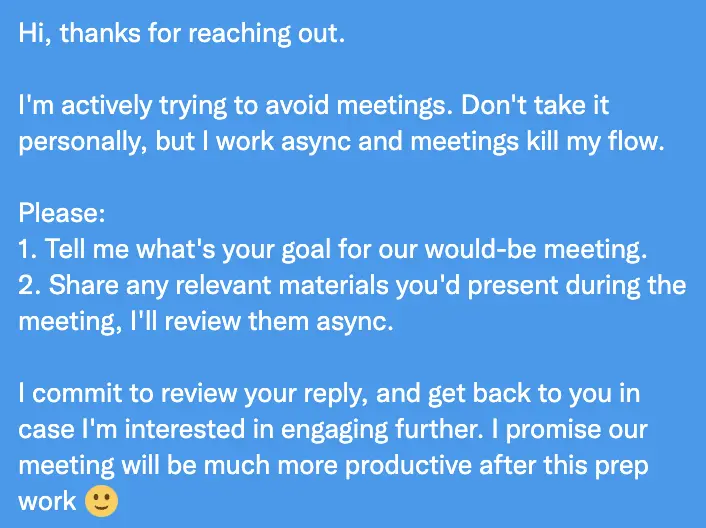How To Reduce Meetings In Remote Work

Meetings are the worst! They burn people out and nothing gets done.
My tweet on meetings and burnout last week hit a nerve. It resonated with a lot of folks.
These are the 7 steps you can follow to aggressively reduce meetings.
1. Avoid recurring meetings
For recurring processes, like weekly standup, make them async by default.
Try to book meetings only if there are blockers or other dependencies that require live discussion. A meeting should be used as the exception, not the rule.
If you have recurring meetings in your team, add this to the agenda for the next occurrence:
"How can we stop having this recurring meeting?"
You'll get weird looks at first, but then everyone will love it.
2. Don't jump on meetings to share information
If the meeting flow would be unidirectional (as in, one party talking and the other listening), make it a piece of documentation instead.
@NotionHQ and @loom are great tools for this. Some use cases are:
- You're collecting feedback on a new feature - Record a video with Loom and describe the feedback you need in Notion
- You're making a demo - Record a Loom and share it
- You're asking for daily/weekly standup - Create a Notion page where everyone adds their written updates
3. Always start a meeting with agenda & goals
If you decided you need to have a meeting for a certain workflow (which sometimes you do need), try to start the meetings by sharing clear agenda and goals with your team.
You can make sure everyone contributes with:
- Clear agenda items
- Clear goals
4. Always end the meeting with action items & assignees
Meetings should come to close with some follow-up actions. Make sure you reserve the last 5-10 minutes of any meeting to collaboratively create documentation on:
- Action items to be done as a meeting follow up
- Clear assignees to own each of them
- Deadlines, if relevant
Points 3 and 4 actually avoid meetings.
Having efficient meetings avoids the proverbial "Let's book a follow-up meeting to continue this conversation".
People naturally love to talk. It's a trap! You can escape it by following efficient processes.
5. Have a "pre-meeting triage" template
For external meetings, push the other party to write the agenda and goals.
You'll find that:
- You can fulfill the goals by writing
- Or you're not even interested
- Or the written pre-work makes the meeting more efficient, if you have it
This is my "pre-meeting triage" template:

Everyone who sends me DMs requesting meetings is receiving this template reply. It's not personal. It's just the way I work. Thanks for your understanding.
6. Plan ahead to avoid rush meetings to handle exceptions
When there's lack of planning, everything is an exception.
Exceptions aren't treated with a "business as usual" process, they are fast-tracked as an urgent matter. When everything is urgent, nothing gets done. Meetings are the natural fallback to handling urgent matters.
These meetings are the worst for everyone, since they don't usually have an agenda. People just breathe heavily together, trying to identify the problem and solve it ASAP.
So, try to plan ahead to reduce exceptions.
7. Book calendar slots for Deep Work
Set your calendar settings to automatically decline any meeting that overlaps.
Also set your status on @SlackHQ to "Do not disturb" to allow yourself to time to tackle tasks that require a deep level of focus for an extended period of time.
If you're a leader, create a safe psychological space for your team members to book and respect each other's Deep Work slots.
Unavailability is unpopular by default, you need to proactively make it popular. The positive results will compound in delivery quality and peer trust.
Follow us for more knowledge about remote work
We'll be publishing new articles every week, and new social media content every day. If you enjoyed this article, follow us on Twitter or Linkedin, and stay in the loop. Share our content and drop us a comment there. Let's help more people learn about remote work.


